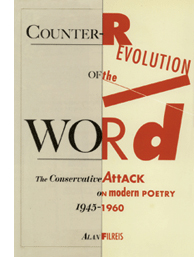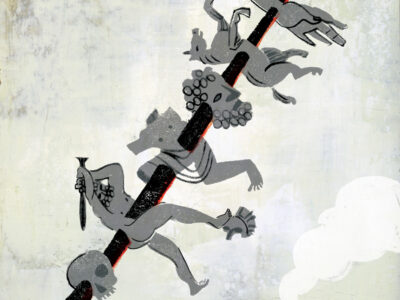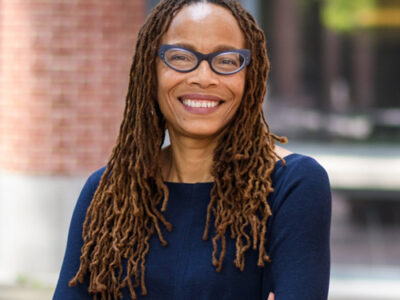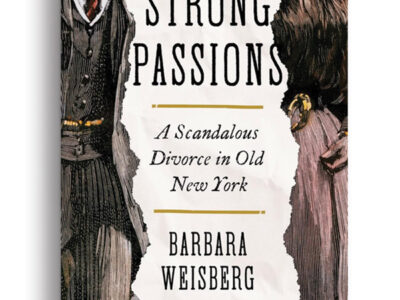Parsing the politics of—and against—modern American poetry.
By Dennis Drabelle

COUNTER-REVOLUTION OF THE WORD: The Conservative Attack on Modern Poetry, 1945-1960
Alan Filreis, faculty.
University of North Carolina Press, 2007. $40.
In writing this study, Al Filreis undertook two tasks: to be a good “archive rat” (a term he has borrowed from historian Richard Hofstadter, who used it dismissively) and to explain a complex movement that blended politics and aesthetics. As a rat, Filreis has few peers. He sifted through special collections, private letters, and other unpublished material in venues from Syracuse to Austin and beyond (even Truchas, New Mexico); thanks to these labors, he has seen through pseudonyms, traced connections unknown to previous scholars, and rescued from oblivion both unjustly neglected poets and their cranky detractors. As an explainer, he asks a lot of his readers, who must juggle multiple isms and related abstractions while trying to sort out the Byzantine strategies adopted by cultural conservatives—though, to be fair, the attack on modern poetry was a movement of such feverish inconsistency as to be nearly incoherent.
Filreis, the Kelly Professor of English whose multiple roles at Penn include serving as faculty master of Kelly Writers House and directing the Center for Programs in Contemporary Writing, divides Counter-revolution of the Word into two parts. In the first, “The Fifties’ Thirties,” he describes how, during the McCarthy era, American anticommunists and antimodernists reinterpreted the 1930s so as to downgrade leftist poets and loosen the bonds between two strains in modernism: formal experimentation and radical politics.
The downgrading, Filreis asserts, has led to the neglect of such poets as Kenneth Patchen and such works as Norman Rosten’s The Big Road, an “ambitious book-length poem about the building of the Alcan Highway.” The revisionists tried to dismiss the ’30s as a phase in which a troubled populace responded to the Depression and the rise of European fascism by dabbling in Marxism and venerating poetry that amounted to little more than Party-line sloganeering. But to Filreis this view overlooks inconvenient facts, such as the work of Alfred Levinson, a somewhat later poet who built on the experimentation of the ’30s. Levinson’s “most politically radical poems,” Filreis writes, “are in fact also his most linguistically inventive.” (And here, for once, the archive rat comes up short. For all his industriousness, Filreis admits that “the trail goes cold” after the 1948 publication of Levinson’s Cauldron, “a modest but promising poetic beginning.” Much later, in the 1980s, more books by Levinson came out, but he’d slipped into such obscurity that Filreis has been unable to find out when he died.)
Some of the most vigorous rewriting of American poetic history was done not by conservatives, Filreis charges, but by liberals. By the 1950s, when communism had become the god that had failed, certain poets were eager to forget their youthful dalliances. As one contemporary observer noted, “The trouble is that the repentant liberals overwhelmed with guilt at having sent $5 to Loyalist Spain prematurely, now try to hang on to the coat-tails of the McCarthys.” The result was what Filreis calls “thirties-bashing,” and “The Fifties’ Thirties” should inspire 21st-century critics to take a fresh look at poems misread or jettisoned as part of that bashing.
In the book’s second part, “Anticommunist Antimodernism,” Filreis shows how two distinct cultural movements became bedfellows. On the face of it, the alliance was not a natural one. Among notable targets of the official Soviet contempt for modernism were two of its greatest composers, Prokofiev and Shostakovich, who were told to stop writing dissonant works that puzzled the Party bosses. How, then, could American scolds argue with a straight face that poets who practiced free verse, incorporated the wording of actual documents into their works, and made poems into verbal collages were advancing the cause of communism?
Some conservative critics instinctually equated poetic formlessness and rule-breaking with political subversion. Others racked their brains to justify their scorn for modernist writing, with one mossback going so far as to theorize that difficult poets were out to alienate ordinary readers, causing them to “repudiate . . . ALL poetry” and thereby leaving Americans less capable of recognizing and dealing with “evil and oppression.” The complainers plumped for the kind of poems they liked to read and write: lyrical ones with rhymes and familiar meters (the works of Phyllis McGinley were much favored). As Filreis wittily puts it, “The best antimodernist offense was a strong iambic defense.” It seems clear in hindsight that what united conservative leftists who criticized the avant-garde in the Soviet Union and conservative rightists who did the same in the United States was devotion to the status quo.
I finished Counter-revolution of the Word unsure of just how successful the counter-revolutionists had been. When you compare some of the big names decried (William Carlos Williams M’06 Hon’52, Marianne Moore, Hart Crane, and Wallace Stevens, among others) with the pygmies doing the decrying (ever heard of Robert Hillyer, Archer Milton Huntington, Peter Viereck, or Stanton Coblentz?), it’s hard to resist the conclusion that history has dealt roughly with the anticommunist antimodernists. Yet they appear to have kept Williams from taking up his duties as poetry consultant to the Library of Congress and, over the 15-year period covered by the book’s subtitle, may have placed “the burden of proof on the [poetic] innovator.” Filreis might have given the reader more help in putting the dual movement in perspective.
The final impression left by this book, however, is a sense of wonder. How seriously everyone—conservatives and liberals alike—seems to have taken poetry a mere half-century ago! Before congratulating our sophisticated selves for approaching poems without ideological blinders on, we might ponder how much better off we are living in a society where poetry hardly matters at all.
Dennis Drabelle G’66 L’69 is a contributing editor of The Washington Post Book World.




